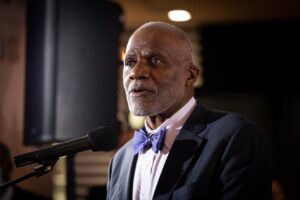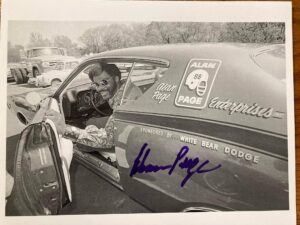Alan Page has had a remarkable career by any measure—actually, by all measures. After being inducted into two halls of fame, college and pro, for his football prowess, he became Minnesota’s first African American State Supreme Court justice, being elected to the seat three times before retiring in 2015. He’s also published four children’s books with his daughter Kamie and helped thousands of young people with the Page Education Foundation he established with his late wife, Diane. Justice Page is a longtime “friend of Gustavus”—the College awarded him an honorary degree in 2003—and he was kind enough to talk with us ahead of his appearance as the special guest for our MLK Day Celebration on Monday, Jan. 16. (The conversation will be livestreamed at the MLK Day link.) This interview has been edited for length and clarity.
Gustavus: From your college years in the 1960s up through to today, the causes of civil rights and equality have made considerable progress in some areas, but they also have faced intermittent setbacks, including recently. What’s your overall assessment of the state of civil rights and equality right now?
Page: Well, I think you’re absolutely right. We have come a long way from the 60s and 70s. We’ve gotten rid of the state-sponsored segregation. But we sort of replaced that with the sense that we had eliminated racial bias. But obviously, over the last few years, it is it has come back with a vengeance. We’ve gotten really good at covering it up, but not very good at making it go away.

Gustavus: With that in mind, what would you tell young people about the best ways to address these social and political issues during chaotic times?
Page: I would start with the notion that each of us has a responsibility to do what we can to make sure that we, as individuals, make our decisions based on what we see and what people do, as opposed to making decisions based on preconceived notions and stereotypes.
I would also say that after looking inward, recognizing that racial issues continue to exist when we are confronted with them, we have to stand up to them, but not in a way that changes who we are. It’s easy to get distracted by somebody else’s bigotry and by those who would impose their bigotry on us. They do it so that they can feel superior to us, and when we direct that bigotry back at them, they accomplish what they set out to do. To the extent that we can, we should just not take on that burden, because the bigotry is their problem, not our problem.
Gustavus: What role does the does the College, and higher education in general, have in ensuring that we don’t leave people behind and give the maximum number of people the opportunity to succeed?
Page: Whether it’s in education, whether it’s in business, whether it’s in law, wherever it is, we have the obligation, the responsibility, to realize we are all better off when we are all involved. This doesn’t mean being inclusive simply because we think we might get credit for it. We benefit from hearing people people’s background and experiences when they’re shared with us. We sometimes think of inclusion as benefiting the one being included; the fact is that we all benefit.
The best example I can give of that is having served on the Minnesota Supreme Court, which has seven members. With seven members you get seven different views based on experience and backgrounds. And those different views come together to produce a richer result and a better result. It’s the same in education. It’s the same in the law, it’s the same in business. It’s the same everywhere. We benefit when everybody participates.

Gustavus: What advice would you give young people who will soon be starting their own professional lives and are looking for ways to make a difference of varying kinds in their communities and in the world?
Page: [The Page Education Foundation] makes it clear that serving others is how we all advance. Paul Wellstone said, “We all do better when we all do better.” Each of us, in our own way, has the ability to help others do better. And in that process, we do better.
Gustavus: Do you have a treasured mentor or mentors who made a difference in your life? Who are some of them, and what kind of lessons did they teach you that led to your interest in the law?
Page: My family and parents are the ones who instilled in me the notion that education was a tool that could be used to not only make a better life for myself—a better one than they had—but it could be used to help overcome the discrimination that one faces. They made it clear that I had to seek excellence, that it wasn’t good enough just to be as good as the next person or to play to other people’s expectations. Growing up in the 50s, I was eight years old when Brown v. Board of Education was decided. That decision sounded the death knell for state-sponsored segregation, not just in education, but across the board. And that gave me a sense of the power that the law has.
